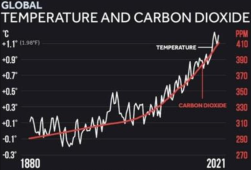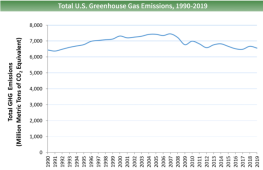svetz
Works in theory! Practice? That's something else
FYI: Using a bigger font in your post doesn't actually bolster your arguments any....I think you have bad data....
That is bad data, more proof you can find anything on the internet if you look for it. From the U.S. EPA data you'll see the U.S. has been reducing emissions since 2007, but it's not a 32% reduction: | But worldwide the PPM of CO2 continues to increase. Other than the "covid-dip", no slow-down from the PPM data....  So, if we're reducing, who's to blame? Read on.... |
You know what they say about a politician when his mouth is moving... It's just more half-truths, from fact-check:China was exempted from the Paris agreement and that's why Trump refused to sign it.
It is true that China said they can't meet the 2050 date, instead, they've committed to 2060. The Paris agreement let's poor countries slide to 2060. By and large most poor countries don't produce that much CO2 anyway. China & India just happen to fall under the bar.Rick Scott: The Paris Climate Agreement is “bad for America,” because it "does nothing to hold real polluters, like Communist China and India accountable."PolitiFact's ruling: Mostly False
Can we force them to uphold their treaty agreements? Yes, but not in the way most think... read on!
Nope, that's typical fear-mongering.Our enemies want us to commit economic suicide.
But first let's answer who's making all that CO2:
| # | Country | CO2 Emissions (tons, 2016) | 1 Year Change | Population (2016) | Per capita | Share of world |
|---|---|---|---|---|---|---|
| 1 | China | 10,432,751,400 | -0.28% | 1,414,049,351 | 7.38 | 29.18% |
| 2 | United States | 5,011,686,600 | -2.01% | 323,015,995 | 15.52 | 14.02% |
| 3 | India | 2,533,638,100 | 4.71% | 1,324,517,249 | 1.91 | 7.09% |
| 4 | Russia | 1,661,899,300 | -2.13% | 145,275,383 | 11.44 | 4.65% |
| 5 | Japan | 1,239,592,060 | -1.21% | 127,763,265 | 9.70 | 3.47% |
| 6 | Germany | 775,752,190 | 1.28% | 82,193,768 | 9.44 | 2.17% |
| 7 | Canada | 675,918,610 | -1.00% | 36,382,944 | 18.58 | 1.89% |
| 8 | Iran | 642,560,030 | 2.22% | 79,563,989 | 8.08 | 1.80% |
So, we're still making a lot. But as to the economic suicide, note the 1-year change column. The "shameful" countries are those not reducing.
Don't expect anything from Iran, they've not signed onto being carbon net-neutral like the rest of the countries.
But as of 2016 China and Russia were already reducing. I know, they're the "evil" countries and yet they're being more responsible than others.
Since 2016 Russia dropped quite a bit but has plateaued the last few years (see image).
India is in a really hard place.
From the 1 year change and total amount they look horrific, but by the per capita you can see they are so far behind other countries it's ridiculous. Yet from this image showing some country's annual emissions you can see that even India has turned the corner.
Long Term Economics
Economically, I believe renewable energy tech will be more favorable in the long run. Solar & wind are already both cheaper than gas, oil, or coal - the only tech holding them back in our capitalist society is Energy Storage, but once that price falls we'll see a rapid switch.
The IPCC report estimates:
So using a 21 trillion GDP that's $1.26 to $7.56 trillion over 30 years for the U.S. That sounds low to me.They met all forecast U.S. energy needs at a net cost of 0.2–1.2% of GDP in 2050, using only commercial or near-commercial technologies, and requiring no early retirement of existing infrastructure.
The Wall Street Journal estimates becoming carbon neutral will cost from $7.8 trillion to $13.9 trillion over the next 30 years.
You think that's a lot? Would it surprise you to know a Yale study found Fossil Fuels Received $5.9 Trillion in subsidies in 2020 alone?
In 2020, total consumption of fossil fuels in the United States, including petroleum, natural gas, and coal, fell to 72.9 quadrillion British thermal units (Btu), down 9% from 2019 (ref). At an average of $2.50/mBTU (2015 ref), that's 72,900 trillion BTUs x $2500/trillion BTUs = $182,250 million the U.S. spent on fossil fuels in 2020. So, that's how much Americans will save per year by not burning fossil fuels.
Nope, and most countries are all on the path to be neutral by 2050.Stop using coal, oil, gasoline and natural gas? Are you kidding me ?
Note that "neutral" doesn't mean we stop using them altogether. We just need sinks for what we do consume.
Some have other uses too, for example, oil is used for plastics.
Last edited:




:max_bytes(150000):strip_icc()/worlds-top-economies_V2-86179c590fa745bfb98b18e709f3ea4b.png)


